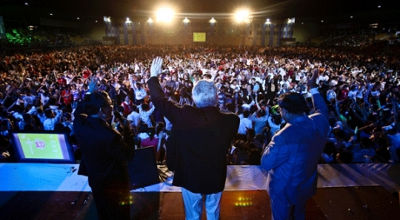Vietnam’s ‘Decree on Religion’ Clamps Down on Christianity
A New Category – and Why Is That?
There are other anomalies and contradictions in the decree. Article 5 adds “religious meetings” (sinh hoat ton giao) as a new, lowest-level practice needing permission or dang ky, “[i]f citizens have a need for religious meetings to worship, pray and express their faith… .” This appears to replace the 2005 PM’s Special Instruction, issued under international pressure, to purportedly grant permission promptly.
“Religious meetings” seeking registration are required to name their organization and beliefs, identity their “representatives” by name and address, specify the number of members, and guarantee that the objectives and contents of the meetings do not offend the “people’s unity,” “cultural traditions” and other virtues exalted in Articles 8 and 15 of the 2004 ordinance.
At points, ND-92 ties itself in knots. One requirement is having a “legal place for religious meetings.” By definition a “religious meeting” seeking permission to meet does not have such a place.
This new requirement apparently means every local congregation must obtain permission to meet before the congregation’s umbrella denomination can apply for higher-level registrations. This is yet another twist in the old tangle of already fully legally recognized denominations going back to register their individual ethnic minority churches. Before ND-92 came along, the government sometimes would order a denomination to do this. Under the new decree, it appears to be a standard requirement. All the while, many Hmong congregations already one or two decades old and affiliated with Evangelical Church Vietnam North, which has had legal registration since 1958, have been waiting years for registration. This provision of the decree only raises the question: what does full legal recognition mean, anyway?
Unreasonable Times Frames – 20 Years and Counting, but From When?
One level up from “religious meetings” is the category of “religious activities” (hoat dong ton giao). Registration at this level requires the demonstration of 20 years or more of “stable” religious meetings, meaning a spotless criminal and administrative record in the eyes of commune-level peoples’ committee. Prior to ND-92, however, the law contained no provision for registration of religious meetings. The prerequisite to registration for religious activities, then, was 20 years of meeting illegally, yet somehow without criminal or legal blemish.
The new decree may have eliminated that particular Catch-22, but it also may have introduced a new obstacle. Consider: The earliest commune-level permissions for religious meetings could first be granted in January 2013. The logical conclusion, then, is that no registrations for “religious activity” could be obtained for another 20 years.
With the period between registration for religious activity and full, legal registration now extended to three years, the first of such registrations could not take place until 2036. And if commune authorities accuse a group of legal or administrative infractions, or of having leaders lacking “the spirit of national solidarity,” the process is further prolonged.
A better, though still dispiriting, possibility is that authorities could decide to start the 20-year, good-behavior period if and when an organization had at least some of its congregations registered under the 2005 PM’s Special Instruction. In this case, the earliest next full legal registrations would be possible in 2028.
There is mounting evidence that the strategy of the government, in sticking with and even extending these unreasonably long time periods, is to pressure unregistered groups to join already registered ones – supposedly to more easily manage the religion file. There is growing government pressure for individual congregations to leave their current organization and join registered groups. And some of these groups, believed to be a bit too friendly with the government, are themselves recruiting otherwise affiliated congregations promising them benefits.
Cumbersome and Complicated Obligations
Registered congregations and denominations are required each October to present all their intended activities for the coming year. Changes in activities are not allowed after permission is granted. This is impossible because religious organizations by nature must deal with members’ unpredictable rites of passage – baptisms, weddings, funerals. There are complicated provisions for varying or adding unforeseen activities, but they are cumbersome and require unreasonable advance notice.
Promises of Efficiency and Clearer Lines of Authority
Government officials are quick to point out that the new decree is more advantageous for religious groups than the old because it shortens the time in which officials must respond to requests and applications, and even requires them to state in writing the reasons in case of denial. Five final articles of the new decree do more clearly describe government lines of authority than the old decree. These “improvements” as described by some government officials, could, if implemented, mean more efficiency in management and control of religion but it is hard to see how, at the same time, they could produce any steps toward greater freedom.
It is possible that already fully registered organizations may benefit from clearer guidelines and timelines in asking permission for training schools and other infrastructure. If authorities abide by timelines required, religious organization will not be left hanging interminably as they often have in under the 2005 decree. It is a big “if.”
















































